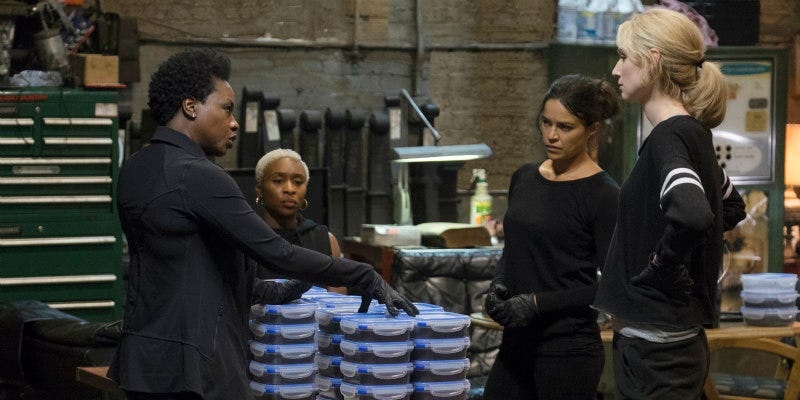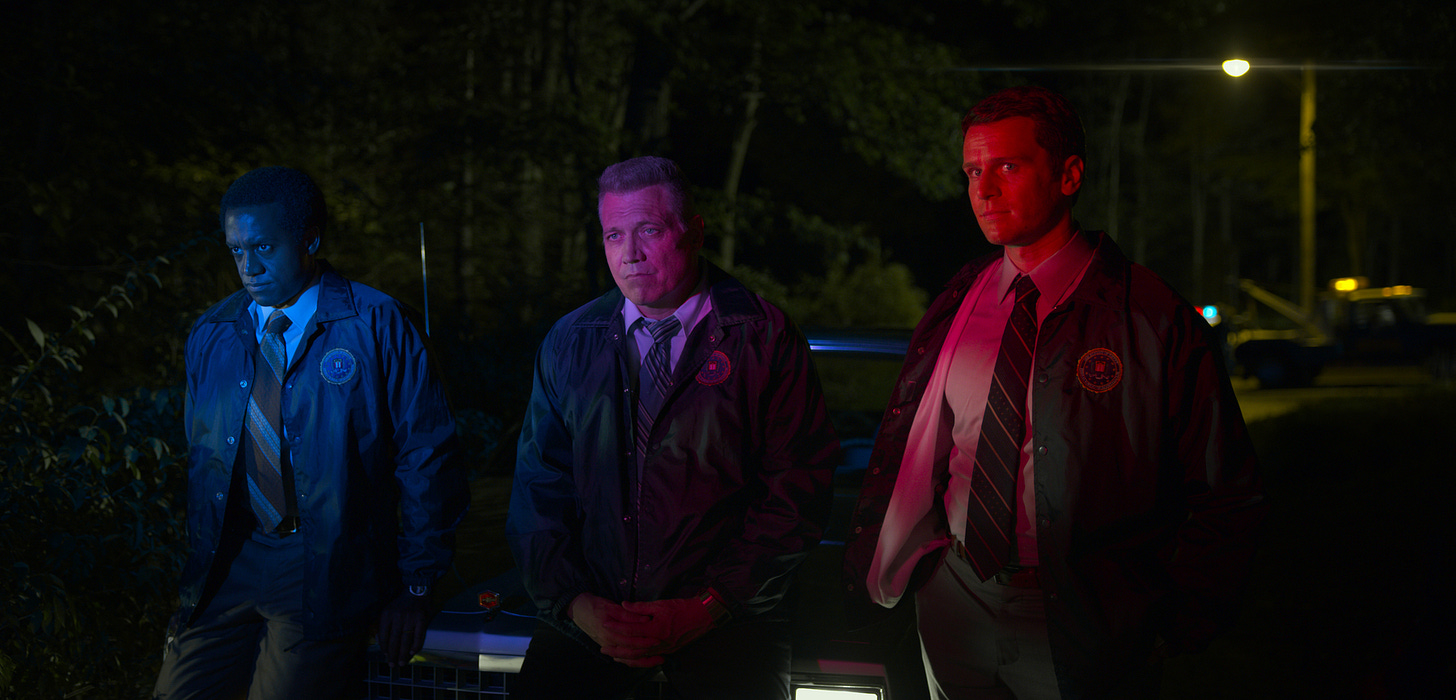
Audiences love a good heist. Something about going along for the ride with professional criminals makes us root for these guys to steal and get away with it. It’s a strange thing, isn’t it? The heist movie turns us into co-conspirators in a way, as we imagine ourselves driving the getaway car or drawing up the flawless plan on a chalkboard. I will never get tired of heist movies. Even the bad ones are at least watchable.
Heist movies have made for some of the most stylish and exciting cinema of the last 50 to 60 years. The tropes of the genre are well-worn, but brilliant nonetheless. We are usually introduced to a central character who needs just One Last Job before they can walk away from their life of crime forever (think The Town). Then it’s time to plan and get the team of specialists together (Ocean’s Eleven or Inception) before executing the job with calculated precision (Ocean’s Eleven, again) or botched carelessness (Reservoir Dogs).
On today’s DYLA, we recommend some of the best streaming heist movies. The actual heist is more integral to the plot in some than in others, but we can guarantee they are all worth checking out.
A brief note: Do You Like Apples is taking a summer break for the next two weeks. We will be back on September 13th with more streaming movie recs. Until then, hold yourself over with some of the previous picks in our archive.
Drew recommends…
Widows (streaming on HBO Now)
Widows is an increasingly rare gem. This kind of smart crime film has been squeezed out of theaters in recent years, and it’s even rarer to see an Oscar-decorated filmmaker step into this genre. With Widows, writer-director Steve McQueen (12 Years a Slave) has fashioned a thrilling mainstream heist movie with plenty on its mind.
This is maybe the slowest, most contemplative heist film ever — and I mean that as a compliment. There are action movie thrills and twists, of course, but they are few and far between. Instead, McQueen lets his outstanding cast cook while he explores broad social themes. Widows impressively ponders Big Ideas like *deep breath* race, gender, religion, power, political corruption, gun ownership, police brutality, and more. For the most part, it avoids feeling bloated.
Widows marks a departure for McQueen and co-writer Gillian Flynn. McQueen’s first three films — Hunger, Shame, and 12 Years a Slave — form a sort of trilogy about suffering. In his latest, he’s depicting grief, a different kind of suffering, but Widows still moves at three times the speed of his previous work. It’s fascinating to watch him go from a prestigious Best Picture winner to something this accessible. Flynn usually writes novels and screenplays about broken and self-destructive women, like Camille Preaker (Amy Adams) in last year’s HBO miniseries Sharp Objects or sociopathic villains, like a certain character in Gone Girl. Here the women of Widows (while criminals) are not wrestling against some inner darkness, but taking desperate action to survive after their brutal husbands left them holding the bag.
Those titular widows lead a ridiculously stacked cast. You may not be too familiar with Elizabeth Debicki or Cynthia Erivo, but they are giving us empathetic performances in limited screen time. You’re paying strict attention whenever they are present. Ditto for the men in supporting roles here. Liam Neeson, Colin Farrell, Brian Tyree Henry, and Robert Duvall are all significant talents handed smaller parts that are interesting nonetheless. However, the actor that steals the show is Daniel Kaluuya (Get Out). His cold-blooded mob enforcer is legitimately one of the most terrifying figures I’ve seen on screen in recent years.
Holding it all together is the great Viola Davis. To pull off a film with such a sprawling narrative and character count, you need someone with the gravitas to center it all. Davis has this in spades. She plays Veronica Rawlings, widow to Neeson’s renowned criminal, with a masterful mix of strength, vulnerability, and drive. On the surface, Veronica is severe and tough, but in other moments, Davis shows us the cracks as Veronica reckons with her husband’s actions. It’s a performance that only a handful of actresses are capable of.
Not quite everything works in this movie. There’s a couple scenes that strain the believability of such a gritty film, and the flashback near the end feels shoehorned in for modern-day relevance. Even if Widows bites off a little more than it can chew, I’d still take it over most crime movies this decade. McQueen and Co. are somehow able to provide heist movie adrenaline without sacrificing a compelling and thoughtful story.
The Killing (streaming on Amazon Prime)
Of course the most famous perfectionist director in film history made a great heist movie. Stanley Kubrick’s The Killing (1956) depicts a rigorous and hard-boiled heist story, where the plan to rob a racetrack of $2 million is meticulously outlined and executed. It’s a bleak, black-and-white crime film that has influenced Tarantino’s Reservoir Dogs, as well as other brand-name directors like Christopher Nolan and David Fincher.
The Killing is viewed as the first sign of Kubrick’s budding genius, although it’s a little difficult to connect the dots from this to strange masterworks like 2001: A Space Odyssey and The Shining. The Killing is pretty low budget, but a must-see for crime movie fans. It takes you through the robbery step-by-step with heist ringleader Johnny Clay (Sterling Hayden) forming his team for One Last Job, a hallmark of most heist films. Hayden is the perfect actor to center a movie like this around, due to his hard edge and unsentimental demeanor. He’s one of the most fascinating actors of that era, also appearing in notable films like Dr. Strangelove, The Asphalt Jungle, and even The Godfather.
Only Clay knows every move of the plan, with the movie keeping us in the dark until we actually see the racetrack theft play out. The Killing’s final scene is memorable and poetic; it’s Kubrick rewarding the patience and attention to detail we gave his film along the way. Even 60-plus years later, The Killing remains one of the foundational heist movies.
Billy recommends…
The Place Beyond The Pines (streaming on Netflix)
Marc Maron was on Conan O’Brien’s late night show and Maron went on a hilarious rant about comic book movies and the negative effect they have on the movies he likes. Maron likes movies where the themes are ambiguous and “adult.” I know this is not a great selling point for our base, but The Place Beyond the Pines fits that mold perfectly.
Having two huge actors like Bradley Cooper and Ryan Gosling would lead an audience to expect a much more conventional movie. This film is not that, but still has the elements of a great heist movie. In this one we follow Luke (Gosling) who transitions into a life of crime to support his lover and their newborn child. This sends him on a collision course with a motivated young detective, Avery Cross (Cooper).
This film is so special in so many different ways, but the main reason is the boldness from director Derek Cianfrance. He wrote the story and directed this film. He decides to split the leads of his film up for the bulk of this film instead of utilizing the high-profile actors throughout the whole movie. It’s a bold choice that strengthens this film greatly. Many movies make the mistake of trying to split time equally throughout the whole film. Cianfrance has a unique style that gives us a much deeper emotional connection to each character. Luke is the one we are supposed to feel empathy for and Avery Cross is the young eager detective getting in the way. Yet, we are still rooting for Cross early on in this film.
Creating two characters we root for or at least have conflicted emotions about during most of the movie allows for much more discussion once the movie ends. Which is what Marc Maron and I love about films like this. Pitting so many characters against each other makes every heist element better and every emotional beat better. Gosling and Cooper have had much more successful movies and more highly acclaimed films, but don’t miss this one because it is turning out to be one of the more underrated films of the 2000s.
Good Time (streaming on Amazon Prime)
Robert Pattinson has survived the Twilight Saga beautifully. Anyone who thinks he is not a talented actor is terribly mistaken. His performance in Good Time is an announcement to the world that he may be the most talented actor working today. Benny and Josh Safdie directed this one and use an abrasive film style that allows Pattinson to shine in every scene he is in.
Maybe shining in this one isn’t the best thing for Pattinson because this is one of the more despicable characters I have seen in a movie. Pattinson plays Connie Nikas who is trying to get enough money to break his mentally impaired brother out of jail. We find out quickly that the journey is not about saving his brother. His motivations are selfish and choosing such a terrible person to portray on screen was a bold choice. The beautiful direction of Good Time made it a brilliant decision.
The Safdie brothers use extreme close ups on their characters throughout most of the movie. Creating a nauseous type atmosphere that enhances the tension in each scene. Connie is an incredibly selfish character. Yet, we are still rooting for him because his brother is in jail. Therefore we want Connie to succeed in every despicable decision he makes. Movies with such a complex emotional range suck me in every single time and I hope it does for you as well. Realizing Pattinson’s talents was such a pleasant shock and putting him into a naturally dramatic setting of a heist movie was a wonderful choice by the Safdie Brothers. Don’t miss this one.
Streaming TV Corner
What we’re watching this week
Drew: Mindhunter (Season 2 streaming now on Netflix)

Billy and I are both thrilled to have Mindhunter back in our lives. The Netflix crime drama about the beginning of criminal psychology at the FBI had an utterly fascinating first season delving deep into the minds of serial killers and the people who study them. The second season went up last week and it’s as good as ever. David Fincher is back directing, lending his sleek and dark visual palette to one of the most complex and absorbing shows out there.
If you enjoyed this newsletter, please pass it along to a friend, share it on social, or shout it from the nearest mountaintop. We’d appreciate it.
If you’d like to read past newsletters, hit up our archive.


